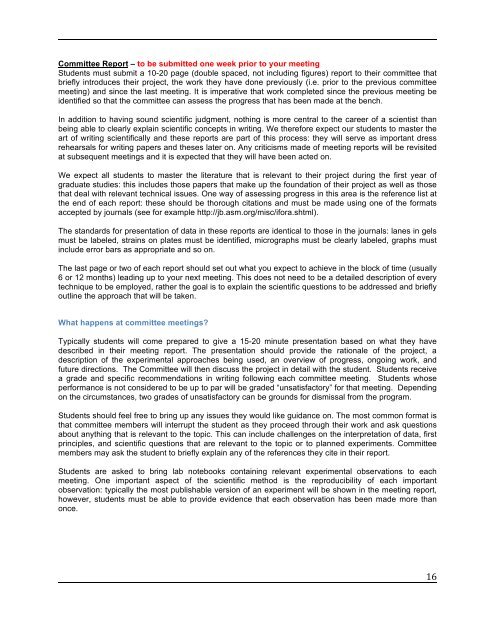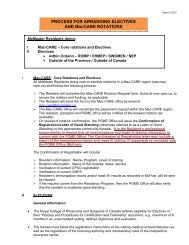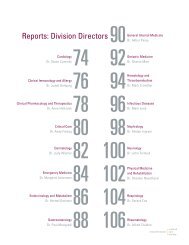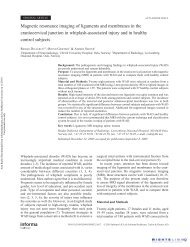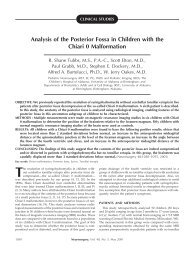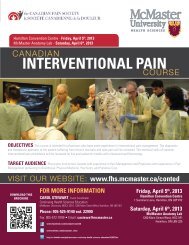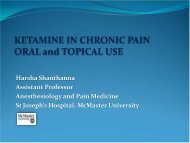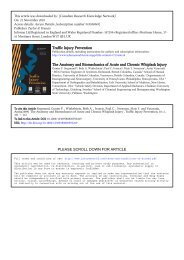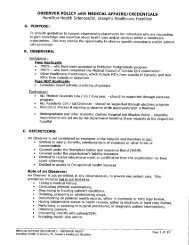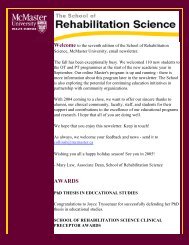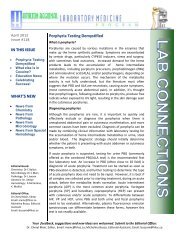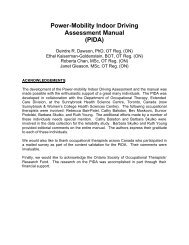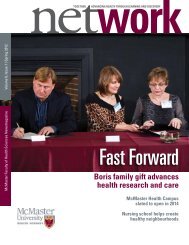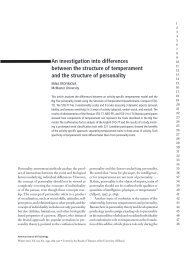Graduate Handbook - Faculty of Health Sciences - McMaster ...
Graduate Handbook - Faculty of Health Sciences - McMaster ...
Graduate Handbook - Faculty of Health Sciences - McMaster ...
Create successful ePaper yourself
Turn your PDF publications into a flip-book with our unique Google optimized e-Paper software.
Committee Report – to be submitted one week prior to your meeting<br />
Students must submit a 10-20 page (double spaced, not including figures) report to their committee that<br />
briefly introduces their project, the work they have done previously (i.e. prior to the previous committee<br />
meeting) and since the last meeting. It is imperative that work completed since the previous meeting be<br />
identified so that the committee can assess the progress that has been made at the bench.<br />
In addition to having sound scientific judgment, nothing is more central to the career <strong>of</strong> a scientist than<br />
being able to clearly explain scientific concepts in writing. We therefore expect our students to master the<br />
art <strong>of</strong> writing scientifically and these reports are part <strong>of</strong> this process: they will serve as important dress<br />
rehearsals for writing papers and theses later on. Any criticisms made <strong>of</strong> meeting reports will be revisited<br />
at subsequent meetings and it is expected that they will have been acted on.<br />
We expect all students to master the literature that is relevant to their project during the first year <strong>of</strong><br />
graduate studies: this includes those papers that make up the foundation <strong>of</strong> their project as well as those<br />
that deal with relevant technical issues. One way <strong>of</strong> assessing progress in this area is the reference list at<br />
the end <strong>of</strong> each report: these should be thorough citations and must be made using one <strong>of</strong> the formats<br />
accepted by journals (see for example http://jb.asm.org/misc/ifora.shtml).<br />
The standards for presentation <strong>of</strong> data in these reports are identical to those in the journals: lanes in gels<br />
must be labeled, strains on plates must be identified, micrographs must be clearly labeled, graphs must<br />
include error bars as appropriate and so on.<br />
The last page or two <strong>of</strong> each report should set out what you expect to achieve in the block <strong>of</strong> time (usually<br />
6 or 12 months) leading up to your next meeting. This does not need to be a detailed description <strong>of</strong> every<br />
technique to be employed, rather the goal is to explain the scientific questions to be addressed and briefly<br />
outline the approach that will be taken.<br />
What happens at committee meetings?<br />
Typically students will come prepared to give a 15-20 minute presentation based on what they have<br />
described in their meeting report. The presentation should provide the rationale <strong>of</strong> the project, a<br />
description <strong>of</strong> the experimental approaches being used, an overview <strong>of</strong> progress, ongoing work, and<br />
future directions. The Committee will then discuss the project in detail with the student. Students receive<br />
a grade and specific recommendations in writing following each committee meeting. Students whose<br />
performance is not considered to be up to par will be graded “unsatisfactory” for that meeting. Depending<br />
on the circumstances, two grades <strong>of</strong> unsatisfactory can be grounds for dismissal from the program.<br />
Students should feel free to bring up any issues they would like guidance on. The most common format is<br />
that committee members will interrupt the student as they proceed through their work and ask questions<br />
about anything that is relevant to the topic. This can include challenges on the interpretation <strong>of</strong> data, first<br />
principles, and scientific questions that are relevant to the topic or to planned experiments. Committee<br />
members may ask the student to briefly explain any <strong>of</strong> the references they cite in their report.<br />
Students are asked to bring lab notebooks containing relevant experimental observations to each<br />
meeting. One important aspect <strong>of</strong> the scientific method is the reproducibility <strong>of</strong> each important<br />
observation: typically the most publishable version <strong>of</strong> an experiment will be shown in the meeting report,<br />
however, students must be able to provide evidence that each observation has been made more than<br />
once.<br />
<br />
16


